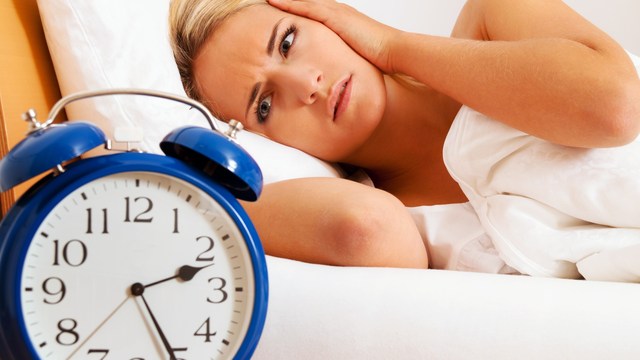 Erwin Wodicka/PhotoSpin
Erwin Wodicka/PhotoSpin
If you have ever thought that stress could be causing your sleep problems, you could be right. Let’s take a closer look at how sleep works and how our stress hormones play a part in disturbing our sleep.
Our sleep cycle comprises light sleep and deep, slow-wave sleep, as well as REM sleep. We need to move through all the levels of sleep to get deep, restful sleep.
We start in light sleep with Stage one, where we have slow frequency brain activity. Stage one generally lasts between 5- 10 minutes and it is the transition from wakefulness to sleep.
We are still in light sleep when we move to Stage two where we have mixed frequency brain waves. The body begins to decrease temperature and heart rate. Stage two lasts for about 20 minutes.
Stages three and four have deeper slow-wave sleep. Stage three is the transition into deep sleep and our brains show slow brain waves called delta waves about 20-50 percent of the time.
Stage four lasts for about 30 minutes. This is when more than 50 percent of the delta brain waves occur.
Finally we reach the fifth stage which is REM, or rapid eye movement sleep. This is where dreaming occurs. During REM there is a combination of brain wave activity and increased respiration rate.
Our sleep cycle moves through Stages one through four, and them back to three and two a second time, before progressing to REM. After REM sleep, we move back to stage two and then start again. Each successive REM cycle becomes a little longer during the night.
How does stress play a role in not sleeping well?
This entire sleep cycle is regulated by stress hormones. The process is called circadian rhythms.
With the normal onset of sleep our cortisol level declines until it gets to its lowest level around midnight. Then it begins to increase until it gets to its highest level of the day around 9 a.m. After 9 a.m. our cortisol levels begin to decline for the rest of the day, settling back into the lowest levels again at midnight.
The brain and the adrenal glands, where our stress hormones are created and released, have a complex system to keep this circadian rhythm in balance.
When the stress hormones are being over-stimulated by brain activity this throws off our balance and interrupts our sleep cycle. Frequent waking or light sleeping is associated with the release of short burst of our stress hormones, cortisol and/or norepinephrine.
So you see when you are stressed, it can impact your sleep. It's not just emotional stress but the release of your stress hormones through your body during your sleep periods.
The simplest way to find out if your cortisol circadian rhythms are being interrupted is to have a licensed naturopathic doctor or functional medicine doctor conduct a salivary test for cortisol. It is the best first step back to a healthy night's sleep.
For more information about salivary testing visit my website www. Healthydaes.com/
Live Vibrantly,
Dr. Dae
Dr. Dae's website: www.healthydaes.com
Dr. Dae's book: Daelicious! Recipes for Vibrant Living can be purchased @ www.healthydaes.com
Dr. Dae's Bio:
Dr. Daemon Jones is your diabetes reversal, hormones, metabolism and weight loss expert. Dr. Dae is a naturopathic doctor who treats patients all over the country using Skype and phone visits. Visit her or schedule a free consultation at her website www.HealthyDaes.com/
Sources:
Basta, M.D., Maria, George Chrousos, M.D, Antonio Vela-Bueno, M.D, and Alexandros Vgontzas, M.D.. "CHRONIC INSOMNIA AND STRESS SYSTEM." NIH Public Access Author Manuscripts. N.p., n.d. Web. 10 June 2014.
http://www.ncbi.nlm.nih.gov/pmc/articles/PMC2128619
"The Role of Cortisol in Sleep." Natural Medicine Journal. N.p., n.d. Web. 10 June 2014.
http://naturalmedicinejournal.com/journal/2010-06/role-cortisol-sleep.
"Brain Basics: Understanding Sleep." : National Institute of Neurological Disorders and Stroke (NINDS). N.p., n.d. Web. 7 June 2014.
http://www.ninds.nih.gov/disorders/brain_basics/understanding_sleep.htm
Reviewed June 18, 2014
by Michele Blacksberg RN
Edited by Jody Smith






Add a Comment1 Comments
I started using Truehope EMPOWERPLUS and it works like a dream no pun intended. Reduces stress and helps you sleep.
June 19, 2014 - 12:14pmThis Comment